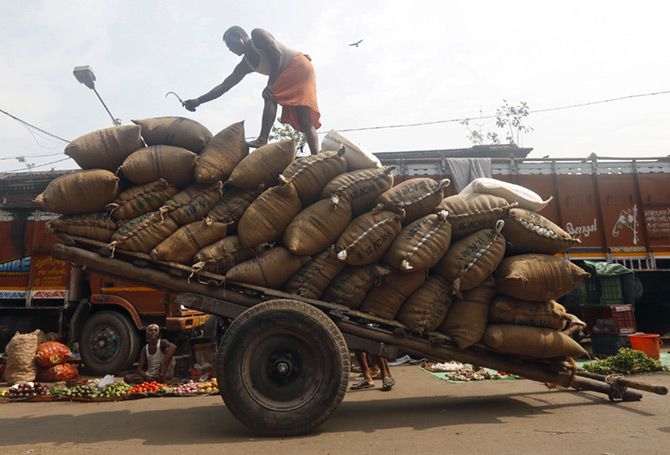The minders of the Modi government's economic policy believe it would take 7 to 8 quarters -- or till around late 2018 -- for the economy to reap the rewards of demonetisation.
Archis Mohan reports from New Delhi.

Prime Minister Narendra Modi's government is bracing itself for a sharp decline in economic growth in the third quarter of the current financial year, as the manufacturing sector and consumer demand decelerates after the demonetisation drive.
The government expects the gross domestic product (GDP) to fall to 5.5% in the October-December quarter, against 7.2% in the corresponding period of the previous financial year, and 7.1% in the first quarter of this financial year. It would be at least a 9 quarter low.
The figures for the second quarter are slated to be released by the end of this month. The economic growth had declined to a 5 quarter low in the first quarter of the current financial year.
The government had expected the economy to grow by 7% to 7.75% in the current financial year against 7.6% in 2015-2016, but this was before demonetisation.
The minders of the Modi government's economic policy believe it would take 7 to 8 quarters -- or till around late 2018 -- for the economy to reap the rewards of demonetisation, top finance ministry sources said.
The Lok Sabha elections are due by mid-2019.
Japanese brokerage Nomura pegged the economic growth at 6.5% in the 4th quarter of 2016 against its earlier estimate of 7.3% and to 7.5% in the 1st quarter of 2017 from the earlier projection of 7.9%.
It should be noted that third quarter of the financial year 2016-2017 is the same as the fourth quarter of 2016.
Nomura said the economy would stabilise in the March quarter, but the heavy impact of demonetisation means growth can accelerate only in the second quarter of the next financial year.
Singaporean brokerage DBS warned of major downside risks to growth because of the demonetisation exercise, and estimated that the gross value added (GVA) can come down by up to 0.80 percentage points lower than its 7.6% target for 2016-2017.
Under the new methodology, GDP is GVA plus product taxes and sans subsidies.
ICRA also said demonetisation will temporarily impact economic activity and revised its forecasts for growth of GDP and GVA downward by 40 basis points each to 7.5% and 7.3%, respectively, in the current financial year.
According to Union finance ministry sources, the government anticipates several long-term gains from its decision to demonetise Rs 1,000 and Rs 500 currency notes.
These are: Shrinking of the informal economy as more transactions are done through formal banking channels, a wider tax base, more public spending and radical interest rates that will, in turn, spur private investments.
While the government has an eye on the long-term benefits, sources assured that immediate needs, particularly of rural areas, were also being addressed.
Chief of these was to ensure money supply in rural areas.
For this, the government and State-owned banks would launch a focused drive for the next 10 days, including deploying mobile automated teller machines, or ATMs, in these areas.
On Monday, November 21, Bharatiya Janata Party President Amit Shah and Power Minister Piyush Goyal held a half hour-long meeting in Finance Minister Arun Jaitley's chambers in Parliament House.
Sources said the meeting was to discuss the current political scenario. It is learnt that the forthcoming assembly elections to five states, including in the key state of Uttar Pradesh, were discussed.
The BJP has conveyed to the government its assessment of the problems that farmers have faced after demonetisation.
Apart from other measures, the government is likely to ask banks to defer the loan repayment schedule of farm debts until after the harvesting of the rabi crop.
On Monday, the Reserve Bank of India announced that farmers can buy seeds using old Rs 500 currency notes.
Several political parties have also urged the government to provide relief to cooperative banks.
Government estimates are that deposits in cooperative banks after demonetisation are much higher than those in other banks.
However, government also suspects that most cooperative banks are controlled by one or the other political party and deal in unaccounted fund of these parties.
But after representation from political leaders -- including from Nationalist Congress Party’s Sharad Pawar, the Left parties in Kerala and even BJP leaders -- the government could suggest to the RBI to lift its ban on allowing cooperative banks to exchange notes.
There have been farmer protests, including in Surat, demanding that cooperative banks start exchanging notes. Most farmers have bank accounts in cooperative banks.
IMAGE: A wholesale market in Kolkata. Photograph: Rupak De Chowdhuri/Reuters











